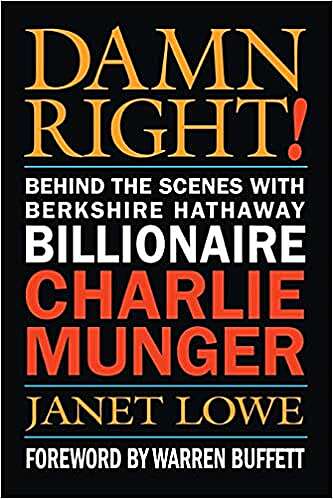
My top 10 highlights from the book:
1. The rabbit runs faster than the fox, because the rabbit is running for his life while the fox is only running for his dinner.
2. I had a considerable passion to get rich. Not because I wanted Ferraris—I wanted the independence. I desperately wanted it.
3. He wouldn't accept anything on face value. His interest in almost everything can be so intense, he will have a perspective that others will not have.
4. He talked about business in a way that was animated and interesting though now I see he was almost broke. I knew he drove an awful car. But I never thought he was anything but a big success. Why did I think that? He just had this air-everything he did was going to be first class, going to be great. He had these enthusiasms for his projects and his future.
5. Charlie drummed in the notion that a person should always "Do the best that you can do. Never tell a lie. If you say you're going to do it, get it done. Nobody gives a shit about an excuse. Leave for the meeting early, Don't be late, but if you are late, don't bother giving people excuses. Just apologize. They're due the apology, but they're not interested in an excuse.”
6. I met the towering intellectuals in books, not in the classroom, which is natural. My family was into all that stuff, getting ahead through discipline, knowledge, and self-control.
7. It is Charlie's philosophy that a first-rate man should be willing to take at least some difficult jobs with a high chance of failure.
8. I am a biography nut myself and I think when you're trying to teach the great concepts that work, it helps to tie them into the lives and personalities of the people who developed them. I think that you learn economics better if you make Adam Smith your friend. That sounds funny, making friends among the eminent dead, but if you go through life making friends with the emìnent dead who had the right ideas, I thìnk it will work better in life and work better in education. It's way better than just giving the basic concepts.
9. Do things that other people aren't doing.
10. Though few companies last forever, all of them should be built to last a long time, says Munger. The approach to corporate control should be thought of as "financial engineering." Just as bridges and airplanes are constructed with a series of back-up systems and redundancies to meet extreme stresses, so too should corporations be built to withstand the pressures from competition, recessions, oil shocks, or other calamities. Excess leverage, or debt, makes the corporation especially vulnerable to such storms. It is a crime in to build a weak bridge. How much nobler is it to build a weak company?